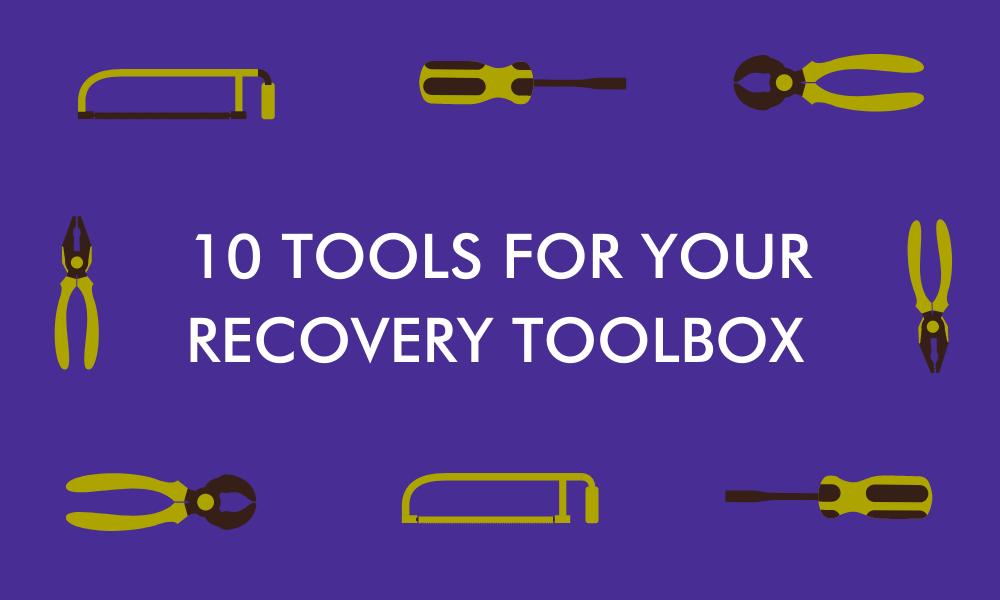
Whether you’re just starting your recovery journey or have been in recovery for some time, it’s always a good idea to have a personalized recovery toolbox. To be successful in your recovery you need to understand your triggers and the tools to help you manage them. That’s why we at Avalon Recovery Society came together to curate the ultimate recovery toolbox – Avalon Edition!
Tools are anything we can use as coping mechanisms to manage our current state. Tools can be unhealthy such as alcohol, drugs, or sugar. Or they can be healthy such as yoga, herbal tea, or meditation. When battling addiction, it can be extremely difficult to handle cravings and break old habits, which is why you want to have a robust toolbox that will be there for you in your times of need.
One of the most important things to know about recovery from addiction is that recovery is more than just stopping the addictive behaviour. Recovery is about identifying the underlying issues and building a balanced life that makes recovery possible.
Here is how you can get started on creating your recovery toolbox:
- Make a list of your go-to tools. Select a maximum of ten tools to commit to. Keep this list with you everywhere. You can notes on your phone or computer, write it in your journal or stick it on your fridge or mirror. Put it somewhere you know you’ll see it.
- Create a physical toolbox. Design or buy something where you can store and carry your tools. Depending on what your tools are – you could have a basket, a pouch, an actual box, whatever works for you. That’s where you can store essential oils, tea, affirmations, etc.
10 tools to consider for your toolbox:
Recovery has changed so much over the years and different types of recovery meetings and support groups have emerged. Depending on what kind of program best fits your needs, you’re guaranteed to find it. At Avalon, we offer meetings all year long via phone, Zoom and in-person (with restrictions). Head to our meeting schedule to see all the meetings we have available.
A sponsor maybe someone you meet in a 12-step meeting or through a connected resource in the community who has more experience with sobriety than you do. They will not only help guide you through the steps, but they also provide support for you that allows you to be open and honest throughout your sobriety. Having a sponsor is a vital part of your recovery toolbox.
Podcasts are taking over. There are so many great recovery podcasts out there it’s hard to know where to start. Head to Apple Podcast or Spotify and search “recovery” to get a taste of what’s out there. Not too long ago, we launched Avalon Recovery Society Radio. You can join Avalon White Rock Centre Manager, Leanne Utendale, every Thursday as she hosts women and allies in recovery who share their stories of experience and hope.
Meditation is such an important recovery tool. It can be challenging at first but don’t get discouraged, it takes time to get used to. Once you make it a habit you will feel the positive effect is has on you. Did you know Avalon offers daily “Step 11” Guided Meditation meetings for women recovering from alcoholism?
Having someone to talk to one-on-one is a powerful tool to use to get yourself entuned with your emotions and triggers. The amazing thing is that counselling/therapy is becoming more and more normalized. This is why if it’s not in your toolbox yet, you should think about adding it. Avalon offers FREE counselling with interns from Adler Masters’ students. To be added to the waitlist, contact one of our Centres for more information.
Essential oils are the perfect on-the-go coping mechanism. Pick a kind you like (lavender is known for helping calm the mind) and pour a few drops on your palms for an instant effect. If you’re at home, try essential oils in a diffuser to enjoy a wide-range of soothing aromas.
There are many amazing private Facebook groups for people in recovery. At Avalon, we have private groups for each centre and for our online community. No matter where you are located, you can find a private group that will support you. Use these groups to share milestones, ask questions, reach out for support or simply share funny pictures. Head to our Facebook page to find a private group that works for you.
From “quit lit” to our weekly blogs, there’s so much great recovery content out there to dive into. Reading is a great way to relax, learn and keep your recovery in check all at the same time. You can find all our blogs here.
Whether it’s at home, at the gym, or out in nature, aim to get your body moving for at least 30 minutes a day. Go for a walk around your neighbourhood and focus on your surroundings – listen to the birds and check out the amazing natural beauty that surrounds you. And if you’re feeling up to something more energetic, check out YouTube for a wide range of Zumba or dance sessions! To be an effective part of your toolkit, you may need to set a reminder for yourself until you get in the habit.
Now that we’ve given you 10 suggested “tools”, think about one or two items that aren’t on the list, but may work for your recovery. Then, put together a recovery toolbox that best suits your needs. Remember, recovery is a lifelong process, so it’s important to reevaluate your toolbox if it’s not working and adjust as needed.
